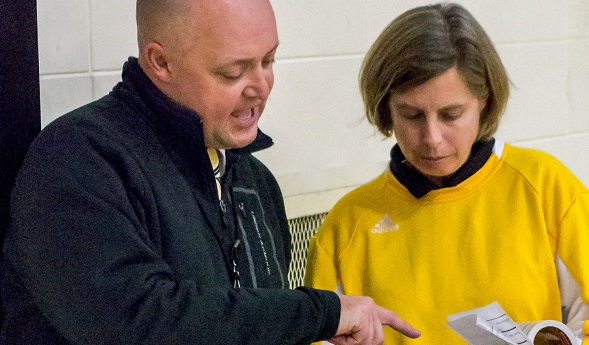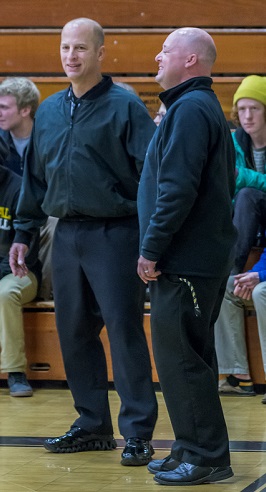
Inglis Finds Next Home at MHSAA
December 4, 2013
By Geoff Kimmerly
Second Half editor
The theme chosen by Portage Northern’s student section for its hockey Regional Final in 1989 was “Kings of the Ice,” and as such they wore Burger King crowns as a sign of the royalty their classmates soon would earn.
Just before team captain Cody Inglis accepted the championship trophy, he skated to his friends and was anointed as well as one placed a crown upon his head.
Golden cardboard and all, Inglis received his team’s prize and circled the ice.
Inglis returned home that night eager to discuss the highlights with his dad Bill, a former professional player and one-time coach of the NHL’s Buffalo Sabres. But there was only one thing Bill had to say – and it’s a principle that’s continued to guide Cody throughout his career in high school athletics.
“I was really looking for his input and congratulations, and he looked at me and said very succinctly, ‘There’s a right way and a wrong way to do things. And you chose the wrong way,’” Inglis remembered this week. “At the time, I couldn’t see it with the perspective of a 17-year-old kid. But now I look back on it as the most valuable life lesson I’ve ever gotten.
“I knew he was proud of me. But the lesson he was trying to impart on me was doing things the right way is much more important than winning.”
Inglis has been doing things the right way for two decades while serving first at Suttons Bay and then Traverse City Central High School. He’ll bring a winning list of achievements and wealth of knowledge when he joins the Michigan High School Athletic Association staff as an assistant director in January.
Inglis, 42, has served as athletic director and assistant principal at Traverse City Central since February 2008, taking over after 11 years as athletic director at Suttons Bay. He also has served as secretary for both the Big North and Northwest Conferences and for 13 years as the northern Lower Peninsula representative of 125 athletic directors for the Michigan Interscholastic Athletic Administrators Association.
Inglis will serve as the MHSAA’s director of ice hockey, girls and boys cross country, girls and boys golf, and girls and boys bowling. In addition, he will assist in the direction of girls and boys skiing and girls and boys track and field, and be in charge of the junior high and middle school committee. Inglis also will assist with the administration of the MHSAA’s Coaches Advancement Program and provide his expertise as an instructor.
“We had more than 100 candidates, including a half dozen of the finest ADs in America – not just Michigan. They couldn’t be any better,” MHSAA Executive Director John E. “Jack” Roberts said. “Cody’s selection was based in part on his being just a slightly better fit to the job description we had in mind.
“He’s had to do some tough things as an administrator. But he’s got a personality that causes people to rally around him.”
On the move
Inglis’ dad, Bill, spent 50 years in pro hockey, most of his final 20 as general manager of the Kalamazoo K-Wings, and Cody grew up in lockerrooms around future pros like Ron Hextall, Dirk Graham and Marty Turco. When the Toledo Goaldiggers won the IHL’s Turner Cup when Cody was in sixth grade, he got to carry the cup through downtown. The family moved 17 times, and prior to the stop in Kalamazoo, Cody had never lived anywhere longer than 2½ years.
Inglis graduated from Portage Northern High School in 1989 and went on to Hope College, where he earned a bachelor’s degree in physical education and his teaching certification. He also was the captain of Hope’s 1992 men’s cross country team and captain of the men’s track & field team in both 1992 and 1993, and earned academic All-America honors for cross country.
Given his ties to pro hockey, Inglis might have had an opportunity to follow his dad. But it wasn’t for him. After graduating from Hope, Inglis enrolled at Western Michigan University to study sports management. He went to class for one day and withdrew – his heart just wasn’t into it.
 Instead, Inglis hooked up with his Portage Northern cross country coach Bill Fries and found what he did want to do – coach, and in doing so, teach athletics.
Instead, Inglis hooked up with his Portage Northern cross country coach Bill Fries and found what he did want to do – coach, and in doing so, teach athletics.
The rest is northern Lower Peninsula history.
Inglis hooked on at Suttons Bay as a 23-year physical education teacher and head cross country and track & field coach, and two years later took over the athletic department.
“I was thrown into the fire right away, but I had a desire to be in sports somehow and coaching was a passion of mine,” Inglis said. “It was kinda sink or swim. I realized the craziness and hecticness of it, but it was something I embraced. I was lucky to have the opportunity to do it at Suttons Bay, to grow there and have people who were willing to let me make some mistakes, learn from my mistakes and become a better administrator.”
Inglis has supervised a group of more than 100 coaches while at Traverse City Central, plus a group of more than 20 teachers and staff as part of his assistant principal duties.
He’s managed more than 100 MHSAA Tournaments, including Ski Finals, Football Semifinals and Hockey Quarterfinals, and a variety of lower tournament levels for hockey, wrestling, track and field, cross country, basketball and golf.
His programs have achieved plentiful success under his leadership. Traverse City Central won the Big North Conference all-sport award every year from 2008-12 and earned six MHSAA Finals team championships during his tenure. The varsity programs have produced 34 academic all-state awards over the past three school years – including 14 in 2012-13 – and 62 percent of the student body was involved in athletics last school year.
While at Suttons Bay, Inglis led an athletic program that won the Northwest Conference sportsmanship trophy nine times and earned two MHSAA Finals championships. He also redeveloped athletic boosters programs, oversaw construction projects and was instrumental in the rewriting of athletic policies at both schools.
He was recognized in the spring with the MHSAA’s Allen W. Bush Award, which recognizes those who serve in high school athletics but do not always receive attention for their contributions.
Mentor to follow
Inglis was instrumental in the creation and later served as an assistant coach for the Traverse City Bay Reps ice hockey team, a co-operative headed by Traverse City St. Francis High School that’s now been in existence 15 seasons. He also was named Division 4 Girls Cross Country Coach of the Year in 2002 by the Michigan Interscholastic Track Coaches Association after leading his team to a runner-up finish at the MHSAA Finals.
Inglis coached a string of girls cross country teams that made the top 10 at MHSAA Finals five straight seasons, plus 25 all-state athletes in cross country and track and field including three individual MHSAA champions.
He has been a member of seven MHSAA sport committees, including for ice hockey. He’s been a frequent presenter at the MIAAA’s annual conferences, covering topics including fundraising, budgeting, organizing successful tournaments, balancing multiple roles and responsibilities, leadership and technology. He’s also taught MIAAA Leadership Training Courses.
Of little surprise, Inglis has been greatly impacted by growing up following his dad. While mother Jeris was the rock of the family, Bill was Cody’s idol and made a significant impact on the manager Inglis has become.
“My dad was so good at the way he treated people. I just saw how he treated them, whether it was the Zamboni drive or an assistant or secretary, he treated them with so much respect,” Inglis said. “That’s the part I’ve really taken from him, how he treated people and the relationships he made. How you treat people in athletics is so key; they’ll treat you the same way back, I’ve found most of the time.”
Inglis received minor degrees at Hope in business administration and communications, and has completed a number of courses toward a master’s in athletic administration from Ohio University.
He is married to Carrie (Ham) Inglis, an MHSAA Finals cross country individual champion for Big Rapids in 1987. They have three sons.
PHOTO: (Top) Traverse City Central athletic director Cody Inglis converses with a member of his staff Tuesday. (Middle) Inglis shares a laugh with an official before Tuesday's girls basketball games. (Photos courtesy of Rick Sack.)

2026 Scholar-Athlete Award Recipients Announced in Class C & D
By
Geoff Kimmerly
MHSAA.com senior editor
February 3, 2026
The Michigan High School Athletic Association has selected 10 student-athletes from Class C and D member schools to receive scholarships through the MHSAA/Farm Bureau Insurance Scholar-Athlete Award program.
 Farm Bureau Insurance, in its 37th year of sponsoring the award, will give $2,000 college scholarships to 32 individuals who represent their member schools in at least one sport in which the Association sponsors a postseason tournament. The first 30 scholarships are awarded proportionately by school classification and the number of student-athletes involved in those classes; also, there are two at-large honorees who can come from any classification.
Farm Bureau Insurance, in its 37th year of sponsoring the award, will give $2,000 college scholarships to 32 individuals who represent their member schools in at least one sport in which the Association sponsors a postseason tournament. The first 30 scholarships are awarded proportionately by school classification and the number of student-athletes involved in those classes; also, there are two at-large honorees who can come from any classification.
Students applying for the Scholar-Athlete Award must be carrying at least a 3.5 (on a 4.0 scale) grade-point average and have previously won a letter in a varsity sport in which the Michigan High School Athletic Association sponsors a postseason tournament. Other requirements for the applicants were to show active participation in other school and community activities and produce an essay on the importance of sportsmanship in educational athletics.
The 32 scholarship recipients will be recognized March 14 during the MHSAA Boys Basketball Finals at the Breslin Student Events Center in East Lansing.
The Class C Scholar-Athlete Award honorees are Maya Carlson, Manistique; Hope Miller, Blissfield; Irelynn Pachulski, Saranac; Gavin Comero, Ishpeming Westwood; Drew Ruddy, Ottawa Lake Whiteford; and Ethan Stine, Bridgman.
The Class D Scholar-Athlete Award recipients are Caila Fitchett, Dryden; Madison Karakashian, Bloomfield Hills Academy of the Sacred Heart; Jack Nelson, Ontonagon; and David Wahl, Gaylord St. Mary.
Overviews of the scholarship recipients of the Class C Scholar-Athlete Award follow. A quote from each recipient's essay also is included:
 Maya Carlson, Manistique
Maya Carlson, Manistique
Played three seasons of varsity volleyball, ran three of cross country, played two seasons of varsity basketball, one of golf, and is finishing her first season of swimming & diving. She also will compete in her fourth season of track & field this spring and has played travel ice hockey throughout high school. Finished among the top four at MHSAA Cross Country Finals twice and earned all-state and academic all-state in that sport. Earned all-region and academic all-state in volleyball and qualified for MHSAA Finals all of her first three seasons of track. Participating in second year of National Honor Society and as treasurer, serving third year as student council president and first as student leadership vice president. Served on Youth Advisory Council and participated in YETI service club throughout high school and served as president of both. Will attend Trine University and major in exercise science.
Essay Quote: “I learned that being competitive and being a good sport aren’t opposites. In fact, they depend on each other. When you respect the game and the people playing it, your victories feel more accomplished, and your losses teach you more.”
 Hope Miller, Blissfield
Hope Miller, Blissfield
Ran four seasons of cross country, is playing her second of varsity basketball, and will compete in fourth of varsity track & field this spring; also played two seasons of varsity soccer. Earned all-state in cross country three times and set school record in that sport, earned all-state two seasons in track and set school records in two races, and earned all-league in soccer. Helped basketball team to league and District titles. Served as cross country team captain the last two seasons. Participating in second year of National Honor Society and as secretary, fourth on student council and as vice president, and third on Lenawee Youth Council. Founded and serving as editor of school newspaper. Participated in two years of debate and received top speaker awards. Is undecided where she will attend college but intends to study ecology or environmental sciences.
Essay Quote: “Sportsmanship allows for a community to be built around a shared love for the sport and a goal of improving oneself as much as possible. In order for athletes to reach their full potential they must be in an environment that supports their goals and their needs as well as encourages them to have fun with their sport.”
 Irelynn Pachulski, Saranac
Irelynn Pachulski, Saranac
Played two seasons of varsity volleyball, is completing her second of varsity basketball, and will play her third season of varsity softball and compete in her fourth season of track & field this spring. Also played two seasons of junior varsity football, and participated on the sideline cheer team as a senior. Earned all-league recognition in volleyball, softball and track, also all-region in softball and qualified for the MHSAA Finals in track the last two seasons. Served as captain in volleyball and softball and served on hiring committees for varsity volleyball and softball coaches. Participated in Scouting throughout high school and attained Eagle Scout rank as a sophomore. Played in marching and concert bands throughout high school, serving as marching band drum major and percussion section leader. Participating in third year of National Honor Society and second on student council, as treasurer. Played lead roles in three drama productions. Will attend Montcalm Community College and study exercise science, then transfer to finish her studies in physical therapy.
Essay Quote: “Sportsmanship in high school athletics starts with strong leadership. When coaches set the pace, players follow. Where an intentional culture of good sportsmanship exists, you can try new things. You can be brave. You can learn.”
 Gavin Comero, Ishpeming Westwood
Gavin Comero, Ishpeming Westwood
Played two seasons of varsity football, is completing his fourth season of wrestling and will compete in his fourth season of track & field this spring. Earned all-state in track & field and all-conference in football and wrestling, and all-academic in wrestling as well. Served as team captain for football and wrestling. Participating in second year of National Honor Society and third on student council. Played in concert/pep band throughout high school and competed with Business Professionals of America the last three years, earning state and national places in BPA and serving as president as a senior. Served as student council vice president as a freshman and sophomore and band council vice president this school year. Participated two years in Key Club and as part of local Big Brothers Big Sisters organization, and served as volunteer youth wrestling coach throughout high school. Will attend University of Michigan and study business administration.
Essay Quote: “Throughout the season I learned the bigger picture of sportsmanship, playing with integrity at all times. No matter what that scoreboard read at the end each Friday night, we continued to play with 110-percent effort. We had every reason to be negative and start pouting, but we remained positive and persisted.”
 Drew Ruddy, Ottawa Lake Whiteford
Drew Ruddy, Ottawa Lake Whiteford
Played three seasons of varsity football, is playing his second season of varsity basketball and will compete in his fourth season of track & field this spring. Earned all-state and academic all-state in football and played on Finals championship and runner-up teams. Qualified for MHSAA Finals in track & field and earned academic all-state in that sport, and earned league scholar-athlete awards in all three sports all four years. Served as captain of all three varsity teams. Serving fourth year as class president and participating in second year of National Honor Society. Participating in third year of Fellowship of Christian Athletes and as huddle leader. Participated three years in Future Farmers of America and was a state competitor, and has contributed to multiple community service projects. Will attend Hillsdale College, but is undecided what he will study.
Essay Quote: “Sportsmanship is a mental discipline that requires integrity, strength of character, and the willingness to make the right decisions every time. It is also about practicing emotional intelligence, exercising self-control, and speaking with respect to others while on and off the field. Sportsmanship is about respecting yourself enough to accept both wins and losses with humility.”
 Ethan Stine, Bridgman
Ethan Stine, Bridgman
Played three seasons of varsity football and two of varsity soccer, is playing his fourth of varsity basketball and will play his fourth of varsity baseball this spring. Earned all-league honors in football, basketball and baseball, all-state recognition in soccer and academic all-state in baseball. Helped baseball team to Division 3 Finals championship as a freshman and all three of his other teams to league and/or District championships. Served as captain of football, basketball and baseball varsity teams. Serving second year on MHSAA Student Advisory Council and participating in third year of National Honor Society, and this year as chapter president. Competed on DECA team throughout high school, twice qualifying for state finals. Is undecided where he will attend college but intends to study engineering.
Essay Quote: “… Sportsmanship is the active choice to empathize with the people around you – whether they wear a stripe, a rival uniform, or our own colors. It's the unwavering commitment to life lessons over scoreboard outcomes. Our wins fade, but the way we treat people under pressure defines us forever. That competitive integrity, built on genuine respect and humility, is the most valuable degree we earn in educational athletics.”
Other Class C girls finalists for the Scholar-Athlete Award were Ashley Carlson, Norway; Lillian Kwiatkowski, Rudyard; Izabella Latuszek, Laingsburg; Anna Poppema, Bath; Addyson Rhodes, Grandville Calvin Christian; Brynne Schulte, Elk Rapids; Molly Soper, Hanover-Horton; Luella Whipkey, Oscoda; and Emma Winans, Perry.
Other Class C boys finalists for the Scholar-Athlete Award were Sean Dammann, New Lothrop; Joe Gaffney, Charlevoix; Ryan Kowalczyk, Pinconning; Amos Miller, Saginaw Arts & Sciences Academy; Luke Paxton, Pewamo-Westphalia; Sean Siems, Kalamazoo Hackett Catholic Prep; Logan Slimko, North Muskegon; Eli Smith, LeRoy Pine River; and Grason Weber, Leslie.
Overviews of the scholarship recipients of the Class D Scholar-Athlete Award follow. A quote from each recipient's essay also is included:
 Caila Fitchett, Dryden
Caila Fitchett, Dryden
Ran four seasons of cross country and also played her first of varsity volleyball in the fall, bowled as a junior and played two seasons of varsity soccer, and will compete in her fourth season of track & field this spring. Earned all-conference in eight track events during her career and all-state as part of the 1,600 relay as a sophomore. Won league cross country championship and served as captain of both the cross country and track teams. Participating in third year of National Honor Society and has served as chapter president two years. Serving fourth year on student council and has held office of vice president, and also has served as president of National Junior Honor Society, Spanish Club and school’s indoor track club. Participating in fourth year of youth group and co-founded Fellowship of Christian Athletes chapter. Earned Rural and Small Town Award from College Board and Horatio Alger Association scholarship. Will attend Hope College and study psychology.
Essay Quote: “Sportsmanship is powerful because it teaches something the stopwatch never could. … It’s not about perfection. It’s not about medals or times. It’s about creating an environment where athletes realize that kindness, belief, and respect can change a season, or even a life.”
 Madison Karakashian, Bloomfield Hills Academy of the Sacred Heart
Madison Karakashian, Bloomfield Hills Academy of the Sacred Heart
Ran third year of cross country in the fall, is competing in third season of varsity skiing and will play third year of varsity tennis this spring. Earned all-region recognition in skiing and has served as that team’s captain three seasons. Competed in equestrian for more than five years including her first two of high school and qualified for national events multiple times. Participating in National Honor Society and serving fourth year in student government. Earned College Board recognition and the Dartmouth Book Award, Women in STEM Award from Rochester Institute of Technology and Rensselaer Medalist Award. Served as captain three years for debate and ethics bowl team, earning all-Catholic honors. Founded school’s all-girls robotics team that qualified for state competition. Founded and served as president of school’s Mental Health Matters Club, and founded company that generated more than $50,000 in revenue in the equine care industry. Is undecided on where she will attend college but intends to study biomedical engineering.
Essay Quote: “Athletics have also taught me that sports mirror real life. There are wins and losses, moments of confidence and moments of doubt. Sportsmanship is what helps you navigate all of it.”
 Jack Nelson, Ontonagon
Jack Nelson, Ontonagon
Played three seasons of varsity football, playing fourth of varsity basketball and will compete in fourth of track & field and golf and second of varsity baseball this spring. Also ran cross country as a freshman. Earned all-conference recognition in football and basketball, all-Upper Peninsula in golf and qualified for the MHSAA Finals in that sport. Served as captain of basketball team for four seasons and football team for two. Participating in third year of National Honor Society – this school year as chapter vice president – serving fourth as class vice president and attended American Legion Boys State. Serving as school radio station student manager, participating in second year of yearbook committee and fourth with school’s TANGO service group, and has participated all four years as part of St. Nicholas Project service efforts. Will attend University of Michigan and study sports management.
Essay Quote: “To me, the two core values of sportsmanship are respect and humility. These traits are important in every aspect of life, whether it's on the court, in the office, or at your grandparent’s house. Sportsmanship is like a compass, not only guiding athletes through competition, but pointing them towards the character values that will shape their lives, long after the final whistle blows.”
 David Wahl, Gaylord St. Mary
David Wahl, Gaylord St. Mary
Played three seasons of varsity football, is playing second of varsity basketball and will play fourth of varsity baseball this spring. Earned all-league recognition in football and served as captain of that team. Earned National Merit Scholarship Commended Scholar and AP Scholar with Distinction awards, and College Board National Rural and Small Town recognition. Participating in third year of National Honor Society, serving as president, and third year as part of school student leadership team. Serving third year as local Downtown Development Authority student representative, and served as representative on national Youth Leadership Council. Participating in fourth years in school’s theatre club and music ministry, and played two years in marching/concert/jazz band earning Division 1 ratings for district and state solo and ensemble. Will attend University of Notre Dame and intends to study civil engineering.
Essay Quote: “Since that day, I approach competition differently. I’ve become a captain who models respect for opponents and empathy for teammates. I appreciate every moment I’m given, recognizing that each play, each season, is a privilege rather than a guarantee. I have learned to temper my drive with humanity and to pursue perfection without sacrificing compassion.”
Other Class D girls finalists for the Scholar-Athlete Award were Emily DelFavero, Wakefield-Marenisco; Isabel Rookard, Mount Pleasant Sacred Heart; Alexa Ross, Bloomfield Hills Academy of the Sacred Heart; Audrey Stone, Bessemer; Lorna Wiesen, Leland; and Hope Woolman, Sterling Heights Parkway Christian.
Other Class D boys finalists for the Scholar-Athlete Award were Zyan Breznik, Adrian Lenawee Christian; Ian Flanagan, Deckerville; Connor Hill, Hillsdale Academy; Brady Jungwirth, Felch North Dickinson; Louis Kowalsky, West Bloomfield FJA; and Noah Zeien, Mount Pleasant Sacred Heart.
The Class B scholarship award recipients will be announced Feb. 10, and the Class A honorees will be announced Feb. 17.
Farm Bureau Insurance of Michigan was founded in 1949 by Michigan farmers who wanted an insurance company that worked as hard as they did. Those values still guide the company today and are a big reason why it is known as Michigan’s Insurance Company, dedicated to protecting the farms, families, and businesses of this great state. Farm Bureau Insurance agents across Michigan provide a full range of insurance services — life, home, auto, farm, business, retirement, Lake Estate®, and more — protecting nearly 500,000 Michigan policyholders.
The MHSAA is a private, not-for-profit corporation of voluntary membership by more than 1,500 public and private senior high schools and junior high/middle schools which exists to develop common rules for athletic eligibility and competition. No government funds or tax dollars support the MHSAA, which was the first such association nationally to not accept membership dues or tournament entry fees from schools. Member schools which enforce these rules are permitted to participate in MHSAA tournaments, which attract more than 1.4 million spectators each year.
-0-

